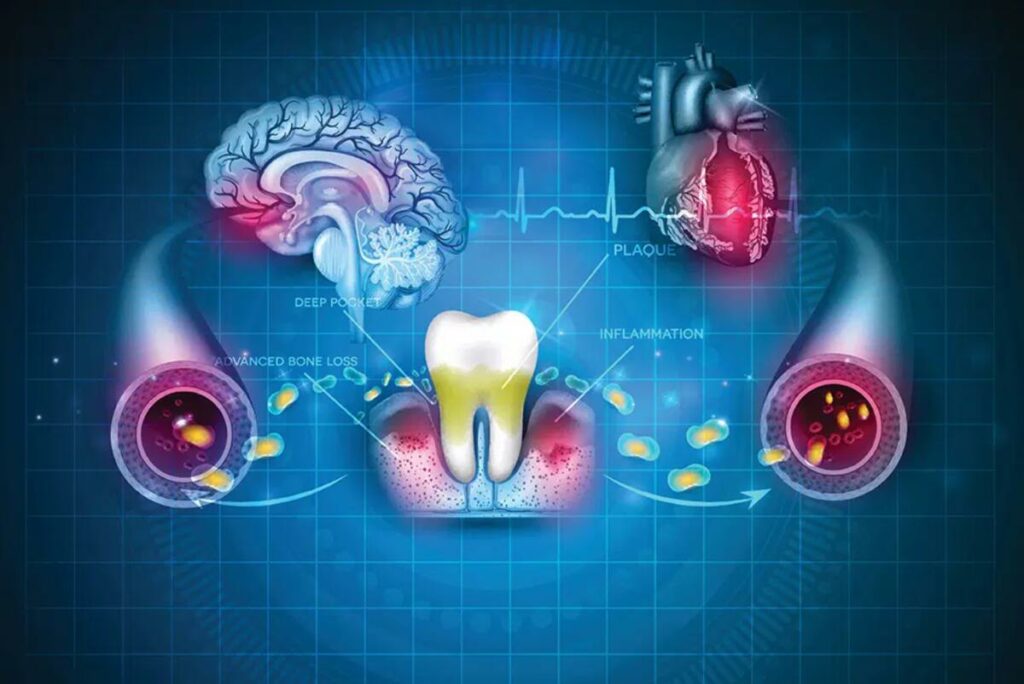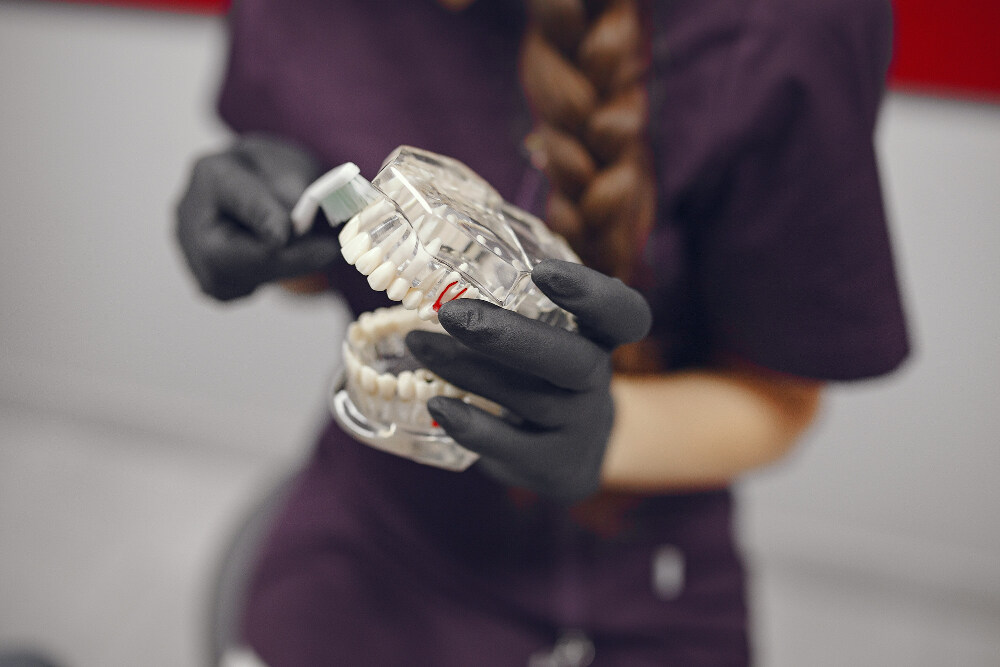Enter the realm of Gum Restoration Products, where prioritizing your oral health extends beyond achieving a beautiful smile to encompass overall well-being.
This article will explore why maintaining good oral health is important and how it’s connected to chronic diseases like Alzheimer’s and diabetes. Did you know your oral health can indicate your overall health?
You can prevent tooth decay and promote oral well-being by making healthy choices and practising good hygiene.
Let’s dive into the fascinating world of dental health and discover its vital role in your overall health and quality of life.
Key Takeaways
- Oral health is a leading health indicator crucial in functional abilities such as speaking and eating.
- Poor dental health can lead to painful, disabling, and costly health conditions, making access to dental care a challenge for rural and lower income households.
- Research has identified a connection between oral health and chronic diseases like Alzheimer’s and diabetes, with a study showing that exposure to periodontal bacteria can initiate the formation of senile plaques found in Alzheimer’s patients.
- Periodontitis, a form of periodontal disease, can affect the brain’s metabolism, liver, and heart, and further research is needed to understand its connection to Alzheimer’s in humans.
Importance of Oral Health

Take care of your oral health to ensure proper functioning and prevent painful and costly health conditions. Maintaining good oral hygiene is essential for your overall well-being. You can protect your teeth and gums from decay and periodontal disease by practising regular brushing, flossing, and visiting your dentist.
Oral hygiene is the foundation of dentistry, focusing on preventing and treating oral health problems. Neglecting your oral health can lead to serious consequences such as gum infections, tooth loss, and even systemic health issues. Poor oral health has been linked to conditions like heart disease, diabetes, and respiratory infections.
Tooth decay is a common oral health problem that can be prevented through proper oral hygiene. Brushing your teeth at least twice daily with fluoride toothpaste and flossing daily helps remove plaque and prevent the buildup of harmful bacteria that cause tooth decay. Regular dental check-ups are crucial for early detection and treatment of dental issues.
Periodontal disease, also known as gum disease, affects the gums and supporting structures of the teeth. If left untreated, it can lead to gum inflammation, bleeding, and eventually tooth loss. Practicing good oral hygiene and visiting your dentist regularly is key to preventing and managing periodontal disease.
The Power of Gum Restoration Products
Embarking on a journey to optimal oral health involves more than just maintaining a beautiful smile; it’s about revitalizing your gums. In the realm of gum restoration products, innovative solutions are paving the way for healthier and more resilient gums. This comprehensive guide explores the diverse range of products dedicated to gum restoration, delving into their unique benefits and the transformative impact they can have on your oral well-being. From advanced toothpaste formulations to specialized mouthwashes, discover the key players in the world of gum restoration. Elevate your oral care routine, prioritize gum health, and unlock the secrets to a confident and radiant smile with these cutting-edge products.
Connection to Alzheimer’s Disease
The connection between oral health and Alzheimer’s Disease is a topic of growing interest in the field of dentistry. It’s important to understand how dental health can impact your overall well-being, especially with a disease as debilitating as Alzheimer’s.

Research has shown that there’s a link between dental health and the development of Alzheimer’s Disease. Studies conducted by Dr. Keiko Watanabe have revealed that exposure to periodontal bacteria, associated with conditions like gingivitis and dental plaque, can initiate the formation of senile plaques found in Alzheimer’s patients. These plaques are a hallmark characteristic of the disease. Furthermore, chronic oral bacterial infection has been identified as a potential risk factor for sporadic Alzheimer’s Disease.
Animal models have also provided valuable insights into the connection between periodontitis and Alzheimer’s. These models have demonstrated how periodontitis, a severe gum disease, can affect brain metabolism, liver function, and heart health.
While the link between periodontal disease and Alzheimer’s is still in the early stages of research, it’s evident that maintaining good oral hygiene and seeking regular dental care is crucial for overall health and well-being. Taking care of your dental health can reduce the risk of developing chronic diseases such as Alzheimer’s.
Studying the Brain and Periodontitis
Researchers have been studying the effects of oral exposure to periodontal pathogens on brain metabolism and function to understand the connection between periodontitis and the brain.
Periodontitis is a common dental health issue characterized by inflammation and infection of the gums and supporting structures of the teeth. It not only affects oral health but also has implications for overall wellness.

Recent studies have shown that periodontitis can have a negative impact on brain metabolism and function. Metabolomic analysis of mouse brain tissues has revealed decreased glucose availability due to oral exposure to periodontal pathogens. That suggests that periodontitis may disrupt normal brain function by affecting glucose metabolism.
Additionally, post-mortem human brains have been found to contain periodontal pathogens, indicating a potential link between periodontitis and brain health. However, further research is needed to fully understand the effects of periodontitis on the brain and its role in the development of neurological disorders.
The Therapeutic Touch of Essential Oils for Gum Restoration
In the pursuit of optimal gum health, essential oils emerge as natural and potent allies. Delve into the world of essential oils for gum restoration, where the therapeutic properties of these oils take center stage. From combating inflammation to reducing harmful bacteria, essential oils offer a holistic approach to nurturing your gums. This exploration will guide you through specific oils renowned for their healing qualities, providing practical insights on seamlessly incorporating them into your oral care routine. Embrace the soothing and revitalizing benefits of essential oils for gum health, and discover a pathway to resilient and vibrant gum health, ensuring your smile radiates confidence and well-being.
Link Between Periodontal Disease and Overall Health
Understanding the link between periodontal disease and overall health is crucial for optimal well-being. Periodontal disease, also known as gum disease, is an infection that affects the tissues and structures surrounding the teeth. If left untreated, it can lead to tooth loss and have severe implications for your overall health.
Research has shown that periodontal disease isn’t just confined to the mouth. It has been linked to various health conditions, including cardiovascular disease, diabetes, respiratory disease, and even certain types of cancer. The exact mechanisms behind this link are still being studied. Still, it’s believed that the inflammation caused by periodontal disease can contribute to the development and progression of these systemic conditions.

Also, poor dental health can negatively impact your overall well-being. Pain and discomfort caused by gum disease can affect your ability to eat and speak correctly, leading to nutritional deficiencies and social isolation. Furthermore, the presence of periodontal disease can affect your self-esteem and confidence, impacting your mental and emotional health.
Maintaining good dental hygiene practices, such as brushing and flossing regularly and regular dental check-ups and cleanings, is essential for preventing and managing periodontal disease. By taking care of your dental health, you ensure a healthy smile and reduce the risk of developing other health problems.
Links to Pre-Diabetes
Maintaining optimal dental health is crucial for preventing and managing pre-diabetes, as the link between periodontal disease and this pre-diagnosis of type 2 diabetes continues to be explored. Here are four important points to consider when it comes to the connection between dental health and pre-diabetes:
- Oral hygiene plays a significant role: Practicing good oral hygiene, such as brushing your teeth twice daily and flossing daily, can help prevent periodontal disease. Keeping your gums healthy may reduce the risk of developing pre-diabetes.
- Periodontal disease may contribute to insulin resistance: Studies suggest that chronic inflammation caused by periodontal disease can lead to insulin resistance, a condition often a precursor to pre-diabetes. By managing periodontal disease, you may also be helping to prevent the progression to pre-diabetes.
- Regular dental check-ups are essential: Visiting a dental service organization regularly allows dental professionals to monitor your oral health and detect signs of periodontal disease early on. By addressing the issue promptly, you can reduce the risk of developing pre-diabetes.
- Lifestyle factors matter: Maintaining a healthy lifestyle, including a balanced diet and regular physical activity, can contribute to overall wellness and reduce pre-diabetes risk. Additionally, avoiding tobacco use and managing stress can also support good dental health and help prevent pre-diabetes.
Challenges in Access to Dental Care
You may encounter challenges in accessing dental care. Despite the importance of dental health and its impact on overall wellness, many individuals need help accessing dental care services. These challenges can include factors such as affordability, availability, and awareness.
Affordability is a significant challenge for many people seeking dental care. Dental treatments can be expensive, and insurance coverage may be limited or nonexistent. As a result, individuals may delay or forgo necessary dental treatments, leading to further oral health problems.

The availability of dental care services is another common challenge. In rural areas, there may be a shortage of dental professionals, making it difficult for individuals to access necessary dental care. Additionally, long wait times for appointments and limited clinic hours can further hinder access to dental care services.
Awareness of dental health and regular dental check-ups is also a challenge. Many individuals may need to prioritize dental health or be aware of the potential consequences of neglecting oral hygiene. Lack of awareness can delay seeking dental care, resulting in more severe oral health issues.
Prevention and Management of Dental Health
It’s crucial to prioritize regular dental check-ups and adopt preventive measures. Here are four important steps you can take to maintain good dental health and hygiene:
Practice proper oral hygiene:
- Brush your teeth at least twice daily with fluoride and a soft-bristle toothbrush.
- Remember to clean your tongue as well.
- Floss daily to remove plaque and food particles from between your teeth.
Opt for dental sealants:
- Dental sealants are thin, protective coatings applied to the chewing surfaces of your back teeth.
- They help prevent tooth decay by sealing out bacteria and food particles.
Maintain a healthy diet:
- Limit your intake of sugary and acidic foods and beverages, as they can contribute to tooth decay.
- Instead, opt for a balanced diet rich in fruits, vegetables, whole grains, and lean proteins.
- Drink plenty of water to stay hydrated and rinse away food particles.
Visit your dentist regularly:
- Regular dental check-ups are essential for early detection and prevention of dental issues.
- Your dentist can identify and treat any problems before they worsen.
- They can also provide professional cleanings to remove plaque and tartar buildup.
Read more content about

